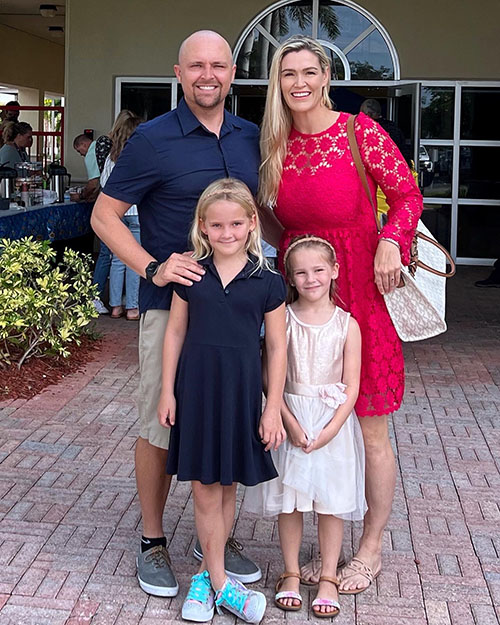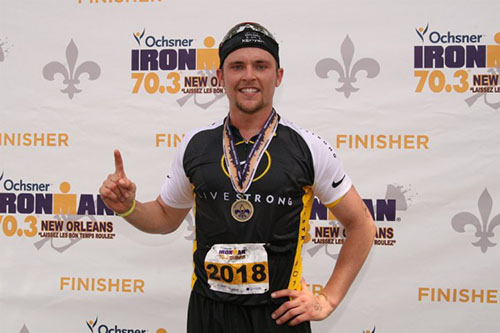Working to beat the odds against a rare form of brain cancer
Medtronic employee helped lead sales for some of the surgical equipment doctors used to fight his cancer
Mike Hugo was driving home from a work event in Miami when he suddenly had a seizure. Injuries from the resulting car accident were minor compared to the devastating news discovered in his MRI: his seizure was caused by a grade IV glioblastoma, an aggressive brain cancer tumor.
As sales district manager for the Medtronic Cranial and Spinal Technologies business which develops technologies and tools used to help surgeons remove cancerous brain tumors, Hugo knew right away his prognosis wasn’t good. Even with treatment, the average life expectancy for glioblastoma patients is 12-15 months. And only a tiny percentage of patients survive more than five years.
“Being in this industry, that was like getting hit with a truck,” said Hugo, a married father of two young children. “I love my kids. I love my wife, and it was tough, but at the same time, whether it’s six months, a year, or five years, my perspective is I get up every single day, and I’m thankful to be here.”
Hugo is also thankful that five years ago he convinced his wife Vanessa to leave her career in litigation so she could pursue her passion for research and writing by joining Medtronic as a clinical researcher. After the initial shock and some time to process her husband’s diagnosis, Vanessa sprang into action — putting the research skills she’d learned in her role for Medtronic to work on behalf of her husband.
“I started with the clinical literature, reading everything I could,” said Vanessa, who became her husband’s fiercest healthcare advocate. “I tried to understand out of all the clinical trials out there, which ones were the most promising, what their strategies were, and which ones were recruiting. We were going to leave no stone unturned. If there was any aspect of his health of history that we could control and we could improve his chances, we were going to do it.”

Tough Decisions
Neurosurgeons like Dr. Michael Ivan from the University of Miami are one of the first healthcare professionals to help guide patients through a decision tree of choices on how to tackle the tumors.
The aggressive nature of glioblastoma tumors usually requires surgery to remove as much of the tumor as possible, but this kind of surgery comes with risks. Certain parts of the brain can control different functions, like speech, vision, processing, and movement. Damage to the brain to any of these areas could mean loss of some function for the remainder of the patient’s life. Neurosurgeons rely heavily on advanced imaging to know exactly where the tumor is, what its boundaries are, and what critical brain networks are nearby.
That’s where surgical navigation systems like the Medtronic StealthStation™ S8 play a critical role. Not only can these systems help doctors plan their surgical approach through advanced visualization and automatic 3-D segmentation tools, but it also helps track the location of the surgical instruments in real time during the procedure.
“For Michael’s care, and for patients like Michael, getting the best imaging to know exactly where the tumor is, its functional boundaries, what critical networks are close to this and what is the risk of the surgery — that is the first step in deciding the best approach,” said Dr Ivan, part of Michael’s care team. “We have a lot of tools at our fingertips to get in there, touch the brain the least amount as possible and to get out — whether that be laser surgery, minimally invasive port surgery, awake surgery, or surgery just based on the functional imaging.”
Since the invasive tumor grows into brain tissue, complete removal isn’t possible, and surgery is usually followed by radiation and chemotherapy aimed at killing the remaining tumor cells. Despite these extreme efforts, the prognosis remains grim for most patients. In almost every case, the tumors still come back.
Mike Hugo felt confident knowing the same cutting-edge technology he’d spent years promoting in his job for Medtronic would be used to help remove his tumor. Though his resection surgery went “spectacularly” and left him with very few function deficits, the tumor started growing back right away.
The Path Forward
Hugo is ready to continue the fight for his life. Fortunately, he’s known for facing tough challenges with an amazing attitude. By the time he’d met his wife, he’d already completed his first Ironman triathlon, widely considered the most difficult one-day sporting event in the world. And when most people would proudly stop after their first, Mike immediately began training for another. And another. He’s crossed the Ironman finish line eleven times in total.

“He’s the strongest person I know,” said Vanessa, who started #IronHugo to raise awareness around her husband’s cancer. “You can take a diagnosis like this and let it beat you up, feel sorry for yourself and let it knock you down, or you can get back up. We’re choosing to see the good and keep fighting every single day.”
Mike’s story served as an inspiration when Medtronic hosted its first ever Cranial Consortium, an event aimed at bringing together more than 60 leaders in cranial neurosurgery from 14 different countries to experience Medtronic’s cutting-edge technology and collaborate with their peers and industry leaders to transform the future of technology in neurosurgery. “As we continue to engineer the extraordinary, it’s important we remember that people like Mike Hugo are why we do what we do,” said Linnea Burman, Vice President and General Manager of Enabling Technologies at Medtronic
“We have two daughters and people tell us all the time about how strong, brave and adventurous our daughters are, and they 100 percent get that from Michael. He’s already passed that on in their young years, and we’re hoping he has many, many more years building them up and helping them grow into the amazing people that they were meant to be.”
While Vanessa continues to raise funds for cancer research, she’s is still actively advocating for her husband to participate in various clinical trials as they search for hope. Their colleagues at Medtronic say they’re working toward a future where artificial intelligence within Medtronic surgical ecosystems may one day be able automatically match patients like Mike with emerging clinical trials that may be best suited for their specific diagnosis. Meanwhile Mike is committed to doing everything he can to beat the cancer and says every word of support matters.
“It’s a game of inches — a game of percentages,” says Mike Hugo, “It all adds up and we’re hoping that it makes a difference.”
L001-11072022
